Outsourced Payroll: What It Means and How It Works
Outsourced payroll is the practice of transferring your company’s payroll responsibilities to an external provider. Instead of your in-house team handling calculations, deductions, tax filings, and payslip distributions, a specialist payroll firm does this work for you under a service agreement. This helps reduce the burden of running payroll and ensures you stay compliant with tax laws.
When you outsource payroll, the first step is onboarding: you provide the provider with your employee data—names, pay rates, hours worked, deductions, benefits, and tax information. This data is loaded into the provider’s system, often cloud-based, and validated. From then on, for every pay period you submit your payroll inputs (hours, overtime, new hires/leavers, salary changes), and the provider processes payroll based on those figures.
The payroll provider handles everything from gross pay calculation to deductions (taxes, social security contributions, pension, benefits) and final net pay. They also submit required reports and filings to tax authorities, generate payslips, issue year-end forms, and maintain payroll records. Essentially, they cover the full lifecycle of payroll administration.
One of the main advantages is reduced risk and maintained compliance. The provider tracks changes in legislation, tax rules, and reporting requirements, so you don’t have to. This helps avoid errors and penalties that can arise from missed deadlines or incorrect calculations. Additionally, their systems often include security measures to protect sensitive data.
However, outsourcing also means you give up some direct control. You’ll still need to coordinate data submission, verify outputs, and communicate with the provider. Selecting a reliable provider is critical—look for experience, strong data security, transparent pricing, and robust support.
Conclusion
Outsourced payroll relieves you of complex administrative work by shifting payroll calculation, deductions, tax filings, and reporting to an expert third party. While you surrender some direct control, you gain time, compliance assurance, and access to specialist systems. Ensuring accurate data, selecting a trusted provider, and maintaining good communication are key to making outsourcing work well.









